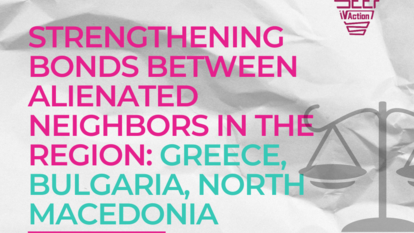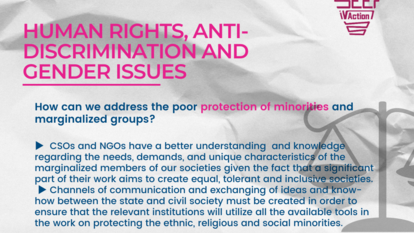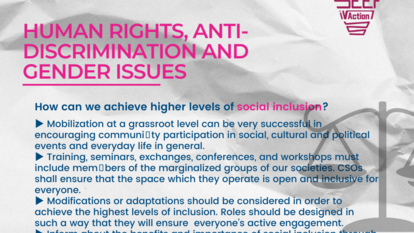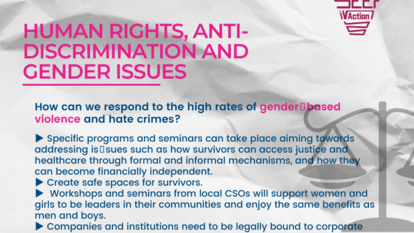Regional Cooperation
ΙΙ. Youth Cooperation Without Borders

For the second round of the project “Strengthening Bonds Between Alienated Neighbors: Greece, Bulgaria, North Macedonia”, SEE in Action brought together CSO's representatives from Greece, Bulgaria, and North Macedonia, with the support of Friedrich Naumann Foundation for Freedom. These organizations are actively involved in the field of human rights, anti-discrimination, and gender issues in the South-East Europe region.
A regress of a number of individual rights and liberties has been observed in recent years. First off, COVID-19 fundamentally altered the structure and nature of the relationship between governments and the general public. Moreover, the lockdowns that have been implemented in various counties brought to the surface social and economic inequalities, while the freedom of expression and the safety of journalists played an important element in the developments on the examined countries.
The subject touches on a number of urgent and important issues that affect not only young people but also the societies in the area as a whole. In all three countries, the issues of human rights, equality, and protection of marginalized groups meet more common elements than differentiations. Stereotypes, nationalistic behaviors, and traditional societal norms are present with alterations in all countries and affect equal participation and the decision-making processes. In order to create equal, tolerant, and inclusive societies many actions need to be made and trilateral or bilateral initiatives may be incredibly helpful to exchange best practices and expertise.
The agenda the participants have discussed and lead them to the final policy proposals included also the EU Action Plan on Human Rights (2020-2024), the increasing number of femicides and gender-based violence, the societal and economic inequalities for marginalized groups of the respective societies and the rights of minorities.
Indicative proposals:
- Laws and safety nets must be introduced into the countries’ legislation that will safeguard the rights of every citizen, especially the right to quality education, healthcare, and housing.
- Companies and institutions need to be legally bound to corporate social responsibility policies and code of conducts that will ensure that workplaces will become safe and tolerant places for all where diversity is respected and protected.
- The establishment of a trilateral platform of advocacy can also be introduced so that CSOs can be informed and updated about changes in legislation, successful examples, and positive changes in each of the three countries while also offering advice, expertise and training on activists and CSOs working with marginalized groups.




Suggested Trilateral Initiatives
What is more, civil society organizations highlight that social inclusion is necessary in order to create societies that offer equal opportunities to individuals regardless of their circumstances. Therefore, they are willing to be active in lobbying, advocating, and putting pressure on the governments and decision-makers in order to ensure that access to basic services such as health care, education, housing, transport services, and employment is available to all members of the society.
⇢ Corporate social responsibility and code of conduct
Advocacy towards businesses and stakeholders for developing internal policies of compliance is vital. Internal policies of compliance identify risks and reduce them to an acceptable level. Human rights, namely gender issues and equality, should lie at the very core of values of any workplace and business environment. Responsible and lawful conduct needs to be established in our region’s corporate culture. Businesses, corporations, organizations and institutions need internal control mechanisms in order to ensure the integrity of financial statements, promote ethical values and operate with transparency.
Disclaimer
The article was written by Eleni Siapikoudi, Project Assistant of FNF Greece & Cyprus, based on the final policy recommendations of the project.
The project “Strengthening bonds between alienated neighbors in the region: Greece, Bulgaria, North Macedonia” was made possible with the support of the Friedrich Naumann Foundation for Freedom. Views and opinions expressed in this paper are those of the author(s) only and do not necessarily reflect those of the Friedrich Naumann Foundation.
